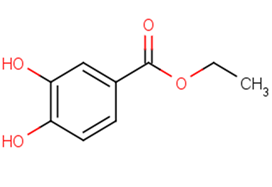
Ethyl 34-dihydroxybenzoate
CAS No. 3943-89-3
Ethyl 34-dihydroxybenzoate( —— )
Catalog No. M20341 CAS No. 3943-89-3
Ethyl?34-dihydroxybenzoate?(EDHB): a prolyl hydroxylase inhibitor attenuates acute hypobaric hypoxia mediated vascular leakage in brain.
Purity : >98% (HPLC)
 COA
COA
 Datasheet
Datasheet
 HNMR
HNMR
 HPLC
HPLC
 MSDS
MSDS
 Handing Instructions
Handing Instructions
| Size | Price / USD | Stock | Quantity |
| 500MG | 37 | In Stock |


|
| 1G | Get Quote | In Stock |


|
Biological Information
-
Product NameEthyl 34-dihydroxybenzoate
-
NoteResearch use only, not for human use.
-
Brief DescriptionEthyl?34-dihydroxybenzoate?(EDHB): a prolyl hydroxylase inhibitor attenuates acute hypobaric hypoxia mediated vascular leakage in brain.
-
DescriptionEthyl?34-dihydroxybenzoate?(EDHB): a prolyl hydroxylase inhibitor attenuates acute hypobaric hypoxia mediated vascular leakage in brain.
-
In Vitro——
-
In Vivo——
-
Synonyms——
-
PathwayOthers
-
TargetOther Targets
-
Recptorprolyl hydroxylas
-
Research Area——
-
Indication——
Chemical Information
-
CAS Number3943-89-3
-
Formula Weight182.17
-
Molecular FormulaC9H10O4
-
Purity>98% (HPLC)
-
SolubilityIn Vitro:?DMSO : 100 mg/mL (548.91 mM)
-
SMILESCCOC(=O)c1ccc(O)c(O)c1
-
Chemical NameEthyl-34-dihydroxybenzoate; Ethyl protocatechuate
Shipping & Storage Information
-
Storage(-20℃)
-
ShippingWith Ice Pack
-
Stability≥ 2 years
Reference
1.Nandan D Clarke E P Ball E H et al. Ethyl-34-dihydroxybenzoate inhibits myoblast differentiation: Evidence for an essential role of collagen[J]. The Journal of Cell Biology 1990 110(5):1673-1679.
molnova catalog



related products
-
7,3,4-Tri-O-methyler...
7, 3',4'-Tri-O-methyleriodictyol has antimutagenic activity.
-
4-methyl-6-phenyl-2H...
4-methyl-6-phenyl-2H-pyranone is derived from Scutellaria baicalensis Georgi and improves mitochondrial functionality to protect astrocytes against hydrogen peroxide-induced toxicity.
-
Clomesone
Clomesone is a compound used as a molecular building block.



 Cart
Cart
 sales@molnova.com
sales@molnova.com


